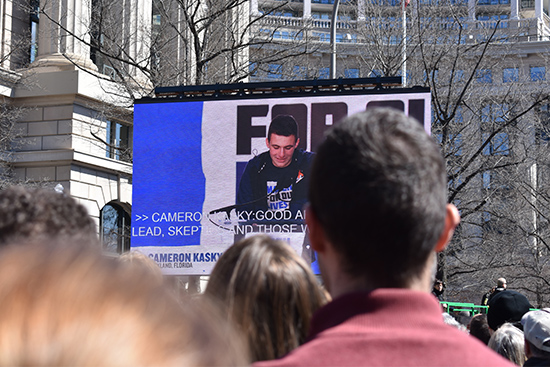POV: What Was Different about the March for Our Lives
Led by young people, millions of Americans now ready for a revolution

We had seen it all before.
The signs. The crowds. The chanting. “Enough is enough.” “Never again.” “Not one more.”
But this protest felt different. This past weekend, I traveled to Washington, D.C., to participate in the March for Our Lives, one of 800 related marches across the globe Saturday calling for commonsense gun laws. With the nation’s Capitol building visible in the distance, I marched, chanted, and hoped alongside nearly one million others who, like me, are fed up.
We’re fed up because 96 Americans are killed each day by gun violence. We’re fed up because mass shootings and school shootings have become commonplace, maybe even expected. We’re fed up because too many of our politicians take their cues (and donations) from the National Rifle Association instead of their constituents. And most of all, we’re fed up because the solutions are so clear.
So we marched. And we chanted. And we listened as the speakers, all young people, shared their experiences and insights. We listened to stories of heartbreak and fear from students ranging from Parkland, Fla., to Chicago to Brooklyn. And we wiped away tears as Yolanda Renee King, nine-year-old granddaughter of Martin Luther King, Jr. (GRS’55, Hon.’59), spoke with more poise and passion than many of our nation’s leaders.
It was a powerful day, to say the least. But why was it different this time?
This time, the march was led by young people. Every speaker emphasized the same message: it’s our turn now. As a 20-year-old college student, I watched and listened with amazement and pride as students and children younger than me addressed a crowd that stretched beyond what the eye could see.
The fact that the march, and the rejuvenated push for commonsense gun reform more broadly, are being led by this country’s youth is significant for numerous reasons. Their leadership echoes the role of students in the Civil Rights Movement and the 1960s anti-war movement. Their involvement has added urgency to the call for gun reform legislation. Children are among those most impacted by gun violence in this country. With school shootings occurring nearly every month, students, with the support of their families and teachers, are now making their voices heard.
Children want to go to school to learn and grow, not to hide under desks and fear for their lives. That’s a narrative, and a reality, that no politician should be able to ignore.

And that brings us to the other reason Saturday’s protest felt like a turning point: yes, you heard the usual catchphrases and slogans that have marked other gun reform rallies, but they were accompanied—even overshadowed—by an even more important message the crowd chanted between speakers: “Vote them out.”
Saturday’s march was aimed at getting out the vote. With crucial midterm elections coming this November, one could sense that this movement’s mission has shifted from rhetoric to action. Yes, it’s necessary to educate Americans on the epidemic of gun violence in this country, but the only way to cause real, concrete change is to vote. And politicians beware, because there are millions of pissed-off Americans ready for a revolution. The message is clear: either do something or start packing up your office. Thoughts and prayers won’t cut it anymore.
The impact of this weekend’s worldwide slate of marches remains to be seen. But I’m hopeful. The message from young people that these rallies are only the beginning shows they’re determined to keep fighting until the necessary change happens. And with all eyes on November’s midterms, this time feels different.
And politicians across America have been warned: stand up, or step down.
Jacob Gurvis (COM’20) can be reached at jgurvis@bu.edu.
“POV” is an opinion page that provides timely commentaries from students, faculty, and staff on a variety of issues: on-campus, local, state, national, or international. Anyone interested in submitting a piece, which should be about 700 words long, should contact Rich Barlow at barlowr@bu.edu. BU Today reserves the right to reject or edit submissions. The views expressed are solely those of the author and are not intended to represent the views of Boston University.
Comments & Discussion
Boston University moderates comments to facilitate an informed, substantive, civil conversation. Abusive, profane, self-promotional, misleading, incoherent or off-topic comments will be rejected. Moderators are staffed during regular business hours (EST) and can only accept comments written in English. Statistics or facts must include a citation or a link to the citation.